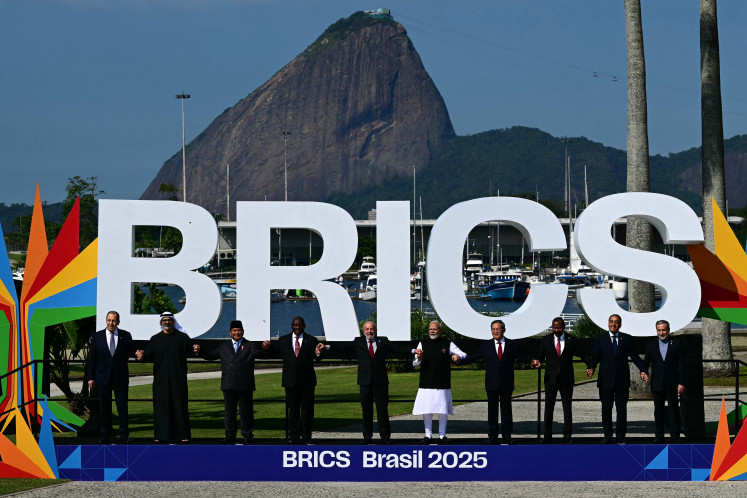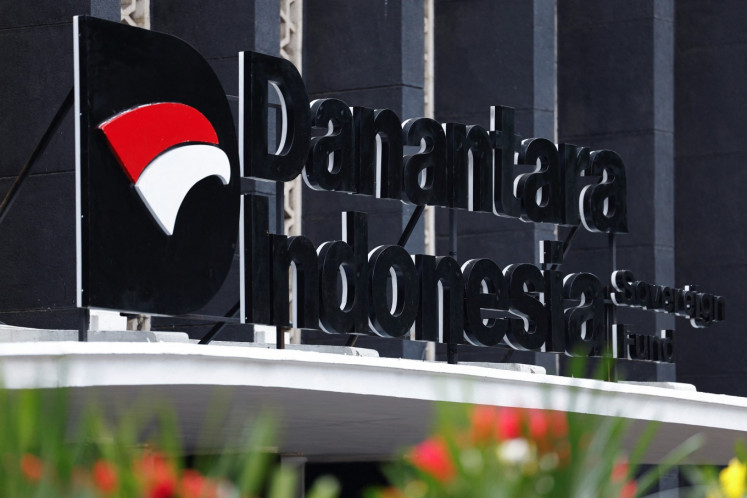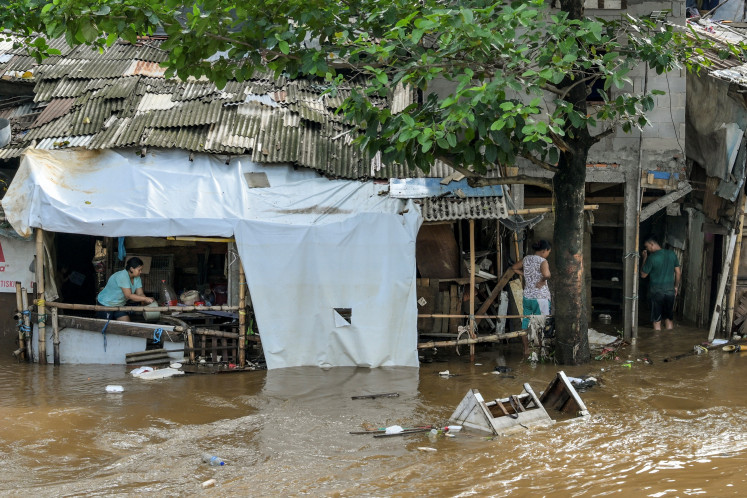Popular Reads
Top Results
Can't find what you're looking for?
View all search resultsPopular Reads
Top Results
Can't find what you're looking for?
View all search resultsGovernor steps up efforts to control groundwater use
Considered to be a gradually sinking city, the capital is facing a tremendous challenge in tackling land subsidence, with the city reportedly sinking by 3 to 18 centimeters every year, while groundwater extraction is seen as a major factor behind this alarming rate
Change text size
Gift Premium Articles
to Anyone
Considered to be a gradually sinking city, the capital is facing a tremendous challenge in tackling land subsidence, with the city reportedly sinking by 3 to 18 centimeters every year, while groundwater extraction is seen as a major factor behind this alarming rate.
Hence, the city administration is set to step up measures to mitigate land subsidence by reinforcing its monitoring of groundwater extraction.
“We have to fix our way of supervising groundwater extraction. Now, we’re like Tom and Jerry playing hide and seek,” Jakarta Governor Anies Baswedan told reporters at City Hall on Wednesday, referring to suspected fraudulent practices regarding groundwater extraction.
Gubernatorial Decree No. 38/2017 on groundwater tax collection stipulates that each building should apply for a permit before constructing a groundwater well. However, in practice some buildings construct illegal wells to avoid taxes. In addition, there is inaccurate data on the volume of groundwater extracted, which is believed to be caused by human error.
Indonesian Settlement and Housing Developers Association advisory board chairman Eddy Ganefo told The Jakarta Post by phone that the administration should first ensure tap water supplies for every building.
“Even if tap water is accessible, would the capacity be enough?” he said, adding that developers would consider economic benefits in choosing between groundwater extraction and piped water supply by the city-owned water company.
The city’s piped water network serves around 60 percent of households, or 851,155 homes.
In an attempt to tighten control on the use of groundwater, Anies said the administration would install automatic water readers that would allow groundwater extraction to be monitored accurately.
The Industry and Energy Agency has allocated Rp 19.7 billion (US$1.33 million) this year to provide 2,277 automatic water readers, which are expected to reduce the need for manual data collection on groundwater
extraction.
The agency’s acting head, Ricki Marojahan, explained that an individual in each district would be in charge of monitoring the data recorded by the reader.
“The accuracy should be better. We can get the data faster as it is recorded in a database, instead of recording the data on paper,” he told the Post.
“We will integrate [the database] with the taxation system,” he added.
The agency’s head of groundwater utilization, Ikhwan Maulani, said any building found to be violating the groundwater regulation would be given three options.
“We will either close their well, they will have to apply for a new permit or permit extension, or they will have to completely shift to tap water,” he said.
Acting Tax and Levy Board head Faisal Syafruddin said the effect of the new recorders and groundwater tax collection would only be seen after two months at least.
“We can get real-time data. How many cubic meters of [groundwater] is extracted can be recorded,” he said.
Faisal added that with the new system, groundwater tax revenue was expected to decrease, as indicated in a shift in behavior from using groundwater to piped water.
“We want to emphasize the enforcement of the groundwater tax regulation so that offices, apartments or buildings use tap water instead,” he said.
When asked about fraudulent practices, Faisal said raids were one of the methods the would optimize the collection of taxes and tackle such practices.
The administration raided several buildings last year, not only to monitor but also re-record data on groundwater extraction on the spot.
“We are not turning a blind eye to such [practices]. The Corruption Eradication Commission has also accompanied the [monitoring] team,” he said, suggesting that such inspections will continue until all parties comply with tax regulations.
Anies said the administration had four measures to tackle land subsidence more broadly, in particular the strict supervision of those who had obtained permits on deep well construction; the installation of water pipes to reduce groundwater dependency; the installation of vertical drainage systems to store water; increase the number of wastewater treatment facilities and improve the storage of treated water.










